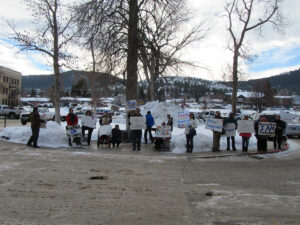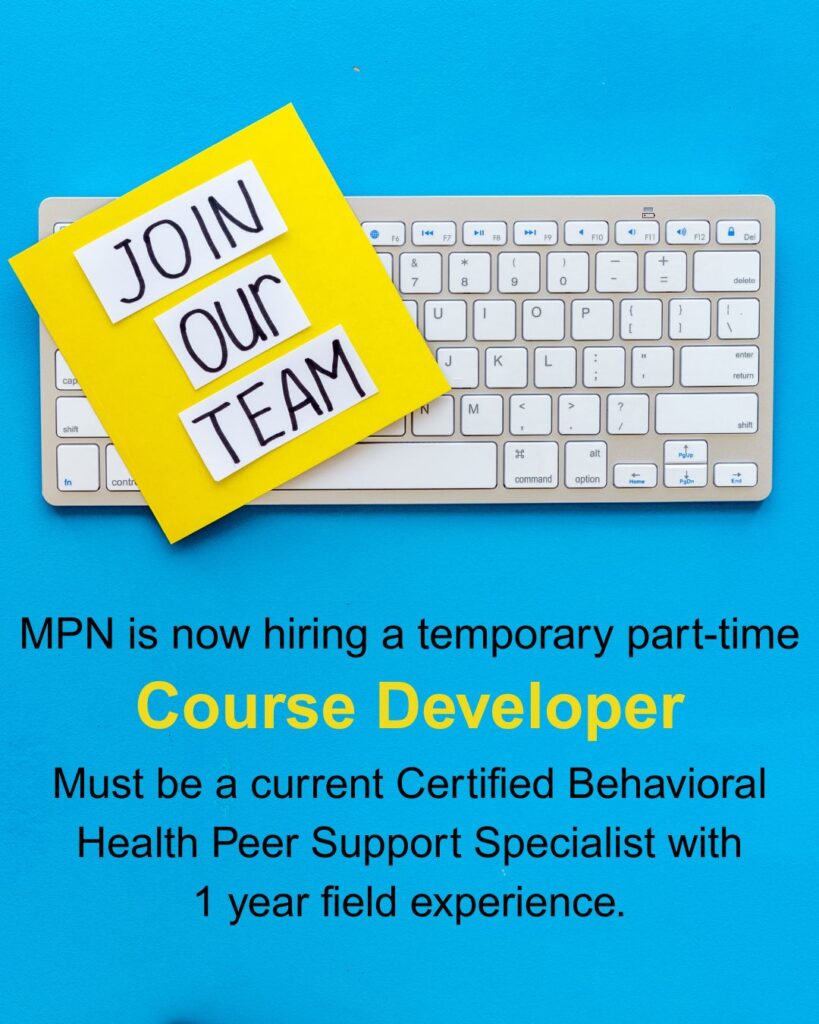We are a network of individuals who are on the path of recovery.
We identify as being in recovery from mental health, substance abuse and or addiction struggles. Together we share information, provide peer support, advocate with a united voice and improve the system. We come from places all across Montana, with different stories and experiences but together we make a difference. This is the Recovery Movement in Montana.



Realizing Recovery Blog
The Importance of Mental Health Awareness
When I started getting diagnosed with mental health conditions, I was still a teenager. I was ashamed, scared, and felt like I was doomed. I come from a family that has both mental health conditions and substance abuse disorders, so I was aware of what they both can look like. It hit me hard, and even though I had seen struggles within my family’s dynamics, I still held shame and guilt from my situation. I later learned that the shame and guilt was not mine to carry, but before that, I carried it like I was packing luggage around, everywhere I went.
May is Mental Health Awareness Month!
Check out stickers and other resources for Mental Health Awareness Month and Children’s Mental Health Acceptance Week!
Mental Health Awareness Month 2023
I have, over the past couple of years, been homing in on specific dimension of wellness and working on the dimension for an entire year. Each of these dimensions plays a key role in my overall mental health.
Forgiveness is Freedom
If I could give another word for recovery, it would be forgiveness because if resentment is the blind spot of addiction, then forgiveness is a corrected vision. Forgiveness is an inner connection versus an emphasis on the crisis. In other words, resentment is fear, and forgiveness is love.
Practices, Principles, and Purpose of Forgiveness
Forgiveness is a big part of a healing journey. It takes a lot of acceptance to be able to forgive and to acknowledge there is a need to understand that whatever it is that is holding one back, or is causing inner conflicts, is not always ours to own. We do not have to completely understand the reasoning behind one’s negative doing to us, we don’t ever have to forget, but being able to forgive, can allow healing and growth to continue.
My Journey to Forgiveness
What is the true meaning of forgiveness? Psychologists generally define forgiveness as a conscious, deliberate decision to release feelings of resentment or vengeance toward a person or group who has harmed you, regardless of whether they actually deserve your forgiveness.
Forgiveness
What an amazing subject to talk about. This will be my first time getting share with you on the topic of forgiveness. I would like to start off with saying if recovery is possible, so is forgiveness. I believe that it is hard to have one without the other. As I was growing up I had examples of forgiveness in my life.
Putting Principles into Practice
In the beginning of my recovery journey my life was about bringing myself to a balanced state of mind so that I could begin to build a life of purpose. Early recovery was about discovering who I was through a healing process that brought me inwards towards many wounds that I felt would be my demise. Through this emotional roller coaster ride, I learned that after the scariest moments of remembering past hurt came equally enlightening moments of truth that helped me face my past and build a life beyond recovery.
Beyond Recovery
Living a life to develop the best results in growth and healing, I have learned to be open and mindful of multiple pathways recovery entails. Beyond the inpatient, outpatient, justice programming, and whatever else was “expected” of me, I have dipped into reconnecting to my traditional, American Indian ways.
Beyond Recovery
Early on in my recovery, I was very focused on myself, and that was necessary. I spent countless hours in treatment, in therapy, and in 12 step meetings.
Advocacy
Check out our new page dedicated to tracking state and federal bills, executive orders, and lawsuits.
 Standing up for what we believe is right, having a voice, making choices in recovery, and sharing our own recovery story are some of the things that make up advocacy and self-advocacy.
Standing up for what we believe is right, having a voice, making choices in recovery, and sharing our own recovery story are some of the things that make up advocacy and self-advocacy.
Let’s start with self-advocacy which refers to an individual’s ability to effectively communicate, convey, negotiate, or assert his/her own interests, desires, needs, or rights. It involves making informed decisions and taking responsibility for those decisions (Van Reusen et al., 1994).
Knowing yourself and your strengths, needs, and interests is the first step toward advocating for your rights. Once we begin to find our way on the path of recovery, we may want to begin to advocate for ourselves with those around us—peer supporters, friends, family, service providers, and doctors. These conversations may be difficult, but having them is vital to your recovery. Remember, you are the expert on yourself.
It may be that prior to getting on the path to recovery, others were making decisions for you or acting in what they believed to be your best interest. Now may be the time for you to let others know what you believe to be in your best interest. You may find yourself in the process of taking control and making decisions affecting your life and perhaps others’ lives. This process of self-determination means making informed choices, problem solving, setting and attaining goals—essentially being a self-advocate.
Advocacy or advocating for others may be something you are interested in doing. Advocating for another person isn’t about acting in a person’s perceived best interest, but it is standing with a person to ensure they are able to articulate and obtain what they want or need. Perhaps you may consider speaking up and advocating for various changes in the services in your community.
Here are a few examples of advocacy:
- Speak to your legislature or a special committee.
- Get involved with an advocacy group or organization.
- Share your recovery story to support others in recovery.
- Whether advocating for yourself, for others, for your community, or as part of an organization, advocacy is very self-empowering. You can make a real difference in your life, the lives of others, and even the community.
- Reach out to Montana’s Peer Network and share your recovery story on one of our “Recovery Talks” podcasts.
Advancing Advocacy Blog
Dehumanization of Vulnerable Populations
As people in recovery, we know that forcing people to comply with specific types of treatment rarely works. Treatment courts often have incredibly high “success” while people are in the program but those successes drop dramatically when there is no longer the threat of incarceration. Effective, long term recovery must be freely chosen and individualized. I wrote about this back in August but it is in the forefront of my mind again because of some statements made by a candidate for city commission in Great Falls.
Peer Support Advocacy Needed
As we head into the last quarter of 2025. There are ample opportunities to advocate for peer support. The Montana legislature wrapped up in the spring after passing the Family Peer Support certification bill. MPN and our sister organization Family Peers for Hope worked hard on rule recommendations to the Board of Behavioral health. We expect the public comment period to open any time now with proposed rules for certification of Family Peer Supporters. This provides us with a platform for advocacy and shaping of the new profession. In the Senate, yes, we know the Federal Government is in shutdown mode, but when they return before they go back on vacation for the winter break Senate bill 1132 includes a provision for family peer support as a service for family caregivers. This needs advocacy to further develop family support.




